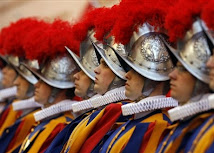
It appears (Via Fr. Z) that the Catholic Church in Madison. Wisconsin, under the shepherding of his excellence, Robert Morlino, will return to communion under one species as the norm.


 |
| The "Spirit of Vatican II" |



First, after battling Lymphoma, various surgeries, chemo & radiation, and a stroke, Archbishop Daniel Buechlein has been allowed to retire by Pope Benedict XVI. His nearly two decades of pastoral reign in the archdiocese have been years of fruitful service that have left the diocese in many ways vibrant and healthy. The con is now in the capable hands of blogging auxiliary bishop Christopher Coyne, apostolic administrator of the diocese.
Archbishop Buechlein intends to return to St. Meinrad Archabbey where he professed solemn vows half a century ago, where he will continue to serve Christ and His Church in whatever way he is able. This, I thought, was a poignant lesson for my students, that one never ceases being a member of the body of Christ, and though our personal vigor and vitality wane, the privilege of Christian discipleship is never vacated.

Ok, I'm not going all Bill Donahue here, but the Rainbow Lights on the Empire State Building bother me. They don't bother me because of any personal bias against homosexuals (because I don't have one), nor is it because of the management's refusal to honor Blessed Mother Theresa of Calcutta on the centenary of her birth (though deserving, I don't think it's the sort of thing she would go for.)
It bothers me only because the ESB fails to say of that which is that it is and of that which is not that it is not. There published guidelines "state clearly that we do not accomodate [sic] requests for religious figures or requests by religions and religious organizations." and that, "The Empire Building's tower lights recognize key milestones, events, charitable organizations, countries and holidays throughout the world, not political or religion related events." (emphasis mine)
Not only is the recent passage of the marriage equality law certainly under the umbrella of political events, but it would seem that the early June blue and white lighting "In honor of the Jewish Community Relations Council of New York" would fall under the umbrella of the above-mentioned excluded "religious organizations."
The guidelines conclude with the caveat that, "We are privately owned and our policies and practices are subject to change in accord with ownerships's [sic] preferences."
ESB, you are indeed privately owned and certainly at liberty to do as you please, but you could have saved yourselves a good deal of time (though certainly not time spent on proof-reading) if you had simply and clearly stated the last line and left it at that. Anything beyond that is just a farce.
s for this post: e.g. scooters, vacation, fall | |
 Jesus said:
Jesus said:





